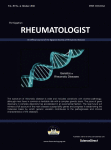Background Rheumatoid arthritis (RA) patients are at an increased risk of developing type-2 diabetes mellitus (T2DM) compared to the general population. Interferon-γ (IFN-γ) was found to have a role in both RA and T2DM. Aim of the work To investigate the role of IFN-γ and its +874T/A gene polymorphism in the development of T2DM in RA patients. Patients and methods IFN-γ level and its +874T/A gene polymorphism were investigated in 70 RA patients with T2DM and in 80 without, in addition to 150 healthy controls. Results The level of IFN-γ was significantly higher in RA patients with (465 ± 64.4 pg/ml) and without (219 ± 50.3 pg/ml) T2DM compared to controls (110 ± 18 pg/ml) (p < 0.0001). IFN-γ +874T/A genotyping showed a significant increase in the frequency of AA genotype (42.9%) and a significant decrease in TT genotype (14.2%) in RA patients with T2DM compared to those without; similarly, the frequency of the T-allele was significantly lower (p < 0.05) and the A-allele increased (p < 0.05); however no significant differences in the genotypes distribution were found between non-diabetic RA patients and healthy controls. The TT-genotyped RA patients with (539.6 ± 4 pg/ml) and without (260 ± 59.6 pg/ml) diabetes had higher serum IFN-γ levels compared to other genotypes (p < 0.001), while in controls, no significant difference in IFN-γ levels according to genotype was observed. Conclusions Serum IFN-γ and its gene polymorphism may play a role in the susceptibility of RA patients to T2DM. The homozygous genotypes AA and TT seem to be more commonly associated with diabetes in RA patients with special contribution of the A-allele.


